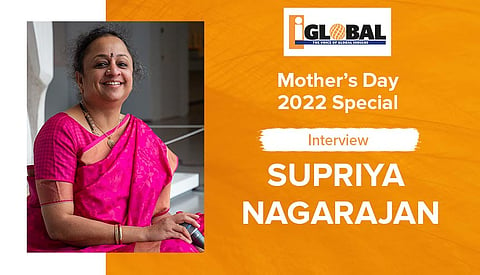

The date we celebrate Mother's Day may vary in different parts of the world, but the essence of honouring the creative and nurturing force of motherhood bridges those divides.
In time for Mother’s Day in the UK this weekend, iGlobal spoke with a prominent British Indian musician and composer based here, Supriya Nagarajan, to celebrate the spirit of motherhood within the universal language of music and ragas.
Born and brought up in Mumbai and one of the most sought after Carnatic vocalists in the UK, Supriya is the CEO of Manasamitra – a UK-based arts organisation. Supriya delivers various art projects and performances, from visual arts to classical and contemporary music, alongside artistic interventions in social and community settings.
Through her mentoring projects, she supports women locally and nationally, seeking ways to create career pathways and opportunities in the music industry.
MORE LIKE THIS...
"I'm going to celebrate Mothering Sunday and Women's History Month by giving myself space and time to contemplate the achievements of all the women who have inspired me," Supriya said.
Talking about the inspiring matriarchs in her life, Supriya reminisces about her grandmother and mother and fondly reflects upon her daughter and granddaughter.
"It starts with my maternal grandmother, who was widowed at 31 in feudal India in the 1930s. The struggle that she had to do, to bring up four children and how she bought my mother and my aunt to be really strong, fierce independent women.
“My mother was again a powerful and people-focused person. She was passionate and caring and always made time and space for the people around her, including family and friends. She was always held up in her social circles as a woman of substance, and obviously, that rubbed off on me, and she brought me up to be a strong independent woman with a mind of my own.
“This I've passed on to my daughter, and when I see my daughter today, it's always surprising to see what a powerful individual she's become! She has got the core of steel running through her underneath the soft and feminine exterior. And the latest addition to the family is my granddaughter, who is two months old now. But I can already see that she is developing a personality."
MORE LIKE THIS...
Supriya has been working tirelessly in supporting women of colour in music through the various mentoring projects of Manasamitra.
She reflects: "The women composing mentoring project was born roughly about four years ago. Artists, especially South Asian women I come across, do not have those soft skills that I had acquired while working in a bank. T
“hey also don't have that many role models who can give them hints and tips on where the industry is going and how they can take their music to the right places. So the mentoring project was born out of that necessity."
Supriya saw a gap in England, where nobody was supporting ethnic minority women composers. The PRS foundation (The Performing Rights Society Foundation) supported this initiative and funded her mentorship programmes.
"If you don't know a certain kind of music exists, you don't know whether you like it. But if you grow the tribe and a lot of people, a lot of women do that kind of music, then as the tribe grows, the music itself grow. So I think it's a win-win situation for everybody, and I'm thoroughly enjoying that aspect of giving back. I'm denting that whole big stone little by little to carve a sculpture that's how I see it," Supriya said.
British Indian women, whether they are singers or instrumentalists, do not see themselves as composers, although they're composing all the time, feels Supriya.
"Improvisation is a form of composition. So when you're doing your various bits of improvisation through your practising Indian musical tradition, you are actually composing. I think composition is just an extension of how you think about your music.
“And so I'm trying to encourage more and more composers, especially from the South Asian diaspora, to think about their music through compositional lenses and how that music can be transposed into other forms," Supriya explains.
MORE LIKE THIS...
Supriya finds her inspiration to compose music from the nature around her.
"The natural world inspires me. The sound of the birds, water, and other things around me inspire me. I see music in everything around me, so I elected to work with Duncan Chapman, a sound artist.
“We did the Lullaby's Sonic Cradle project in Oslo, a presentation of lullabies from across the world in a soundscape and with live Indian lullaby being sung within the mix. So Duncan collected sounds of the tram in Oslo, the sounds of the cathedral bells, people walking in the snow, the sound of rain and the sea and the coast of Oslo – all those sounds are musical in their own way, and they came together into the soundscape which made the audience feel very much part of the show.
“And then within that, there were two singers, myself and a Norwegian singer and the show was incredible because we had about 300 children sleeping in the space as the lullabies were being sung. So that for me is sort of a perfect example of a project where sounds and music and geography of the world that we inhabit all come together."
And that is how Supriya Nagarajan concluded this Mother's Day Special interview, on a soothing note and an inspiring visual where children in this world are sleeping peacefully, where no war is being fought, or blood is shed. A perfect world cradled in love, where lullabies are sung transcending religion, language and cultural barriers.